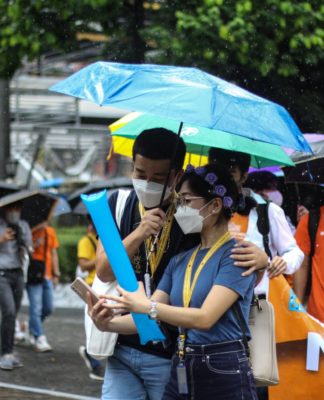THE COUNTRY’S largest association of Catholic schools is crying foul over an order by the Commission on Higher Education (CHEd) setting new standards that could lead to the closure of private colleges and universities, but not state-owned schools.
In paid newspaper advertisements last May 6, the Catholic Educational Association of the Philippines (CEAP) enumerated “myriad infirmities” in CHEd Memorandum Order (CMO) No. 46, series of 2012.
The order is biased against private schools as some provisions do not cover public higher educational institutions (HEI), CEAP pointed out. “On the basis of CMO 46, CHEd can close private universities for substandard performance,” the statement said. “[But] it cannot close State Universities and Local Universities and Colleges. That’s unfair.”
CEAP is a non-stock, non-profit organization of Catholic educational institutions that recognizes religious instruction as an essential element of Catholic education. UST is part of the 1,345-member CEAP.
CMO 46, titled “Policy Standard to Enhance Quality Assurance (QA) in Philippine Higher Education through and Outcomes-based and Typology-based QA,” aims to improve the quality of graduates by setting quality assurance standards.
Quality assurance, as defined by the order, is “an ongoing process of evaluating and enhancing the quality of the higher education system, institution, or program to assure stakeholders that acceptable standards of education, scholarships and resources for delivery are being maintained.”
HEIs must meet certain standards depending on their classification—professional institutions, colleges, or universities. In the case of universities, CMO 46 requires faculty members to produce research, inventions and patents; establish links with other research institutions; and provide a full range of basic post-secondary to doctoral degree programs.
Quality assurance
The order requires all HEIs to be under a standard “outcomes-based” and “typology-based” quality assurance scheme, which is entirely different from the individual measures of quality assurance of HEIs at present. This mechanism “cannot be equitably implemented,” CEAP claimed.
“The CHEd decries a large number of HEIs operating in the country. Instead of just closing substandard HEIs for non-compliance with minimum standards, it has approved a quality assurance mechanism that cannot be equitably implemented, if it can be meaningfully implemented at all,” CEAP said in its statement.
CEAP claimed the hasty implementation of the order was due to pressure from international organizations like the Association of Southeast Asian Nations (Asean) and Asia-Pacific Economic Cooperation forum.
Yet CMO 46 contradicts the quality assurance schemes being put in place in the member-countries of Asean, CEAP said. CEAP stated in its paid advertisement that CMO 46 is inconsistent with the Asean policy that quality assurance agencies must be independent from the government, the universities being monitored and the market.
Section 9 of the CMO 46 designates CHEd, which is under the Office of the President, as an “external agency” along with private accrediting agencies like the Philippine Accrediting Association of Schools, Colleges and Universities, Philippine Association of Colleges and Universities Commission on Accreditation and other agencies.
CHEd officials, who sit on the boards of state schools, are responsible for “reviewing the charters of institutions of higher learning and state universities and colleges including the chairmanship and membership of their governing bodies and recommend appropriate measures as basis for necessary action.”
“CMO 46 moves counter current to the international quality assurance mechanisms now being put in place in the Asean,” CEAP said.
Freedom at stake
The memorandum order will curtail the academic freedom of HEIs, as guaranteed by the Constitution and Republic Act (RA) 7722 or the Higher Education Act of 1994, CEAP also said.
According to Sec. 2 of RA 7722, the State shall “protect academic freedom and promote its exercise and observance.” Section 13 fortifies this by assuring that “nothing in the Act shall be construed as limiting the academic freedom of universities and colleges.”
CEAP argued that CHEd went beyond the constitutional guarantee of academic freedom in “determining who teaches, whom to teach, what to teach and how to teach.”
“Where it gets the power to mandate what is properly left to the HEIs, especially the private HEIs, to determine in academic freedom, is unknown,” CEAP said. “This is a violation of the academic freedom to determine WHAT to teach.”
In a letter to CHEd last April 23, CEAP President Fr. Gregorio L. Bañaga, Jr. said that while CEAP recognizes the efforts of CHEd to uphold quality education, President Aquino and lawmakers should review the contexts of the memorandum order.
“We call on the President and the legislators to read CMO 46 for themselves, consider the issues we have raised and help return order and rationality to our CHEd in pursuit of quality higher education,” Bañaga said.
CMO 46 was released by CHEd on Dec. 11, 2012 and is expected to be fully implemented in 2014.

















